
New Books in German Spring 2022
New Books in German promotes German-language literature for translation into English. We feature recommendations of the best new fiction and non-fiction titles from Austria, Germany, and Switzerland. Books which we recommend benefit from guaranteed financial support for their translation into English.
Great stories and ideas travel and translate well. New Books in German provides trusted, expert, independent recommendations of excellent German-language books that will suit anglophone readers. Twice a year we convene expert juries in the UK and US to select books submitted to us by German-language publishers.
Contact: Sarah Hemens
These are the recommendations for Spring 2022
Single title

A leading German historian tells the life story of an up-and-coming medievalist Carl Erdmann – whose stubbornness, moral compass, and...
A leading German historian tells the life story of an up-and-coming medievalist Carl Erdmann – whose stubbornness, moral compass, and sense of academic rigour ensured that his university career was cut short under the Third Reich. This biography is testament to the ways in which Nazis controlled university culture, but also to the choices facing individual academics as scholarship became increasingly personal and political.
Erdmann was born in 1898 and was ethnically a Baltic German, his personal and professional existence being defined by his status as an outsider. He never married, and trained as a medievalist with a steadfast adherence to academic discipline. However, his sense of his subject was formed outside of the academic sphere, during years working in Portugal before his doctorate. Later, too, it would be shaped by a lived commitment to truth and insight rather than institutionalised scholarship.
Although Erdmann was a promising young scholar with a respected postdoctoral thesis, he was shunted to the margins of a Prussian research institute and denied even fractional, precarious teaching opportunities on personal and political grounds. His specialism – medieval Europe –was appropriated by the Nazi myth, and subjected to skewed and racist interpretation. Reichert shows how peer reviews were weaponised against Erdmann, and how he was finally conscripted into service a couple of years before the end of the war. He died in 1945.
This biography is based on thorough research, and is structured both by theme and by category, giving a sense of the course of Erdmann’s life, geographical centres that were significant for him, contexts such as the Nazification of German universities, and Erdmann’s scholarship and legacy. Along the way, Reichert highlights his academic “enemies”, showing the different choices colleagues made and the opportunities they took or refused during the Third Reich.
In concluding, Reichert reflects on the nature of resistance: Erdmann does not fit a political definition of an actively political, organised, and coherent activity in opposition to the regime. Indeed, for much of the period Erdmann was in denial about the extreme existential threat posed by the Nazis. However, he cannot be categorised as part of the “silent resistance”, nor an “inner émigré”, as literary authors who stayed in Germany during the war are often described.
Reichert’s contextualisation is succinct, insightful, and balanced and his study is readable and rigorous. His portrait of Erdmann is clearly drawn, giving a strong sense of a stubborn and difficult, but morally commendable man; an individual who was academically objective, but also personally reserved to the point of never having romantic liaisons and addressing nobody outside his immediate family by the informal “Du”.
The story of his ostracisation from German academia is not sensational or tragic, but it offers a quiet counterpart to the biographies and discussions over the past decades of German academics, perhaps most obviously Heidegger, who accommodated or espoused Nazi ideology to their professional advantage. It is also a timely portrait of a scholar with international academic values, resonating with current political arguments about free speech in universities in particular.
Folker Reichert is Professor Emeritus at the University of Stuttgart, a medievalist and prize-winning historian, and author of many academic titles, including biography. None of his books have yet been translated into English, but he has been translated into Italian and Japanese.
- Publisher:
- ISBN:
- 978-3-534-27403-1
- Author:
- Folker Reichert
- Pages:
- 424
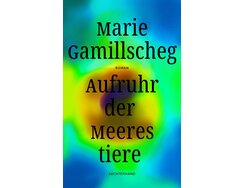
Marie Gamillscheg’s second novel, An Uprising of Sea Creatures, is a timely and carefully crafted book, exploring themes of the...
Marie Gamillscheg’s second novel, An Uprising of Sea Creatures, is a timely and carefully crafted book, exploring themes of the body, the individual and the impact humanity is having on the natural world. Gamillscheg has already won a number of awards for her work, and has been hailed by Spiegel online as ‘one of the most exciting young voices of German-speaking literature’.
Luise is a young marine biologist who has made a name for herself with her ground-breaking research on the American comb jelly, or sea walnut. Her life revolves around her work. She has little contact with her divorced parents or her older brother, and her relationship with food and her own body is complex and destructive.
Despite the success of her research, Luise’s work seems to be stalling – and so when she is asked to help set up a research centre at a renowned zoo in her home town of Graz, she seizes the opportunity. The zoo’s founder, Rainer Schilling, has had a major influence on her; as a child, she watched his TV programmes about the natural world. But returning to Graz also means having to confront her past.
In Graz, Luise stays at her father’s flat while he is away. Things don’t quite go to plan at the zoo, and Luise is unhappy about the direction in which plans for the research centre are moving. The famous Dr. Schilling is almost impossible to pin down, and he has his own philosophy about zoos, claiming that animals are happier there than in the wild.
Luise reacquaints herself with the city of her childhood, visiting her mother and delving into memories of holidays with her father. In a phone call with her brother she learns that their father is severely ill, a fact he has been concealing from her. Luise finds herself forced to examine her urge to run away from her past, and her eating disorder, which seems to stem partly from the desire to disappear.
Offered a stable, well-paid job at the zoo, she is on the verge of giving up her academic position, but reflecting on the endless movement of the ocean, she manages to find her way back to herself. The novel ends with Luise eating a full meal and packing her bags to leave Graz, before what seems to be an imaginary encounter with her father on his return home.
Gamillscheg is a sensitive writer, combining keen observation with an adept use of language. The relatively long chapters are divided into shorter sections, sometimes only comprising a line or two, and towards the end the prose occasionally shifts into loose, non-rhyming verse. The novel switches seamlessly from surrealist episodes to an intense focus on the details of the real world.
Reminiscent of Elfriede Jelinek’s writing, An Uprising of Sea Creatures is a lyrical, unsettling and philosophical novel from a promising young author.
- Publisher:
- ISBN:
- 978-3-630-87562-0
- Author:
- Marie Gamillscheg
- Pages:
- 304
- Price:
- € 22.00
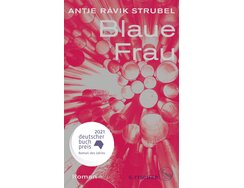
Antje Rávik Strubel won the German Book Prize 2021 with Blue Woman, a complex and multi-layered novel with poetic use of...
Antje Rávik Strubel won the German Book Prize 2021 with Blue Woman, a complex and multi-layered novel with poetic use of language. Interwoven with reflections on cultures of memory and political power in Eastern and Western Europe is the tale of a young woman trying to deal with the trauma of having been raped: to take back her own agency and to go on living.
Adina was the last teenager to grow up in her village in the Czech Giant Mountains, and even as a child, she longed to get away. While attending a language course in Berlin with a view to becoming a student there, she meets a photographer, Rickie, who gets her an internship in an up-and-coming arts and leisure centre in the Uckermark in north-east Brandenburg.
Traumatised by a rape that no one takes seriously and that somehow renders her invisible, Adina travels northwards across Europe to Helsinki, seeking refuge. She works illegally in a hotel and meets Professor Leonides, an Estonian Member of the European Parliament, who falls in love with her. While he campaigns for human rights, Adina searches for a way out of her inner exile and the speechlessness that has resulted from the rape, attempting to find a language for what has been done to her and to take back control of her own life.
The narrative is interspersed with lyrical discussions between a first-person authorial narrator and the ‘blue woman’, whom she meets in a harbour in Helsinki, exploring ideas about writing, the empowerment to tell stories and the nature of storytelling itself.
The novel interweaves a range of narratives and perspectives, shifting between Germany, Helsinki and Adina’s childhood village, and slipping backwards and forwards in time as Adina processes what has happened to her. Bringing in perspectives other than Adina’s enables Strubel to add richness to her exploration of who is allowed to have a voice.
Adina first appeared as a character from Strubel’s earlier work Snowed Under, translated by Zaia Alexander and published by Red Hen Press in 2008, but her story in Blue Woman is a standalone narrative. Reflecting her struggle to find her way back to herself, Adina isn’t immediately accessible to the reader as a character – but her resilience throughout the novel is appealing and engaging.
Exploring questions of identity, reinvention and transformation in contemporary Europe, Blue Woman is a striking and poetic novel which will appeal to readers who enjoyed Eimar McBride’s A Girl is a Half-formed Thing.
- Publisher:
- ISBN:
- 3-10-397101-X
- Author:
- Antje Rávik Strubel
- Pages:
- 432
- Price:
- € 24.00
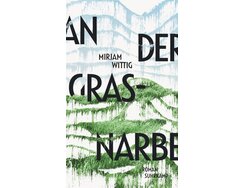
Mirjam Wittig’s debut novel By the Sward is a nuanced, literary and timely examination of young people’s mental health in the 21st century,...
Mirjam Wittig’s debut novel By the Sward is a nuanced, literary and timely examination of young people’s mental health in the 21st century, and the anxieties triggered by terror attacks and climate change. Set in the present day, it tells the tale of Noa, a young woman who leaves the city and volunteers to work on a farm in the South of France, hoping to alleviate her panic attacks and live a simpler, more peaceful life.
However the farm does not prove to be the idyll she had imagined. Farming has become increasingly demanding, primarily due to the effects of climate change, and Ella, Gregor, and their 11-year-old daughter Jade – who live on the farm – are only just squeaking by. As the summers get hotter, the water level in the nearby river is becoming more unpredictable, dropping precipitously and then swelling dangerously when torrential rains come – as if the planet itself is experiencing the same kind of anxiety as Noa.
When Noa’s friend Merle comes to visit her on the farm, she tries to convince Noa that running away isn’t the answer. Gregor, on the other hand, makes an eloquent argument for retreating from what modern life has become. In the end, Noa ultimately decides to accompany the great “transhumance,” the movement of sheep between winter and summer pastures, suggesting that she is still seeking a viable path through life, a way to survive in this anxious world. Her path forward is not clear; learning to survive will require a great deal of perseverance and patience, and achieving good mental health is a task that is certainly not for the faint of heart.
Written in the first person, the occasionally darting, flitting nature of the narrative draws the reader in to Noa’s disordered state of mind and reflects the difficulty we all have in pinning down cause and effect in relation to modern anxieties. Internal and external “landscapes” overlap and interact in this relevant and timely depiction of an increasingly preoccupying aspect of today’s world that will appeal to readers of Madeleine Watts’ The Inland Sea.
- Publisher:
- ISBN:
- 3-518-43062-9
- Author:
- Mirjam Wittig
- Pages:
- 189
- Price:
- € 23.00

Yvonne Zitzmann’s Days of Forgetting is an unsettling and thought-provoking debut novel by an author already acclaimed for her YA writing. Exploring...
Yvonne Zitzmann’s Days of Forgetting is an unsettling and thought-provoking debut novel by an author already acclaimed for her YA writing. Exploring territory probed by the Academy Award-winning film Eternal Sunshine of the Spotless Mind and Anna Smaill’s The Chimes, Zitzmann combines questions about memory and trauma with the tension and suspense of a thriller.
Days of Forgetting is narrated by Dr Wechsler, a scientist and researcher working under the single-minded and somewhat sinister Professor Marx. Wechsler is in charge of a clinical trial aimed at testing a drug believed to be able to erase specific memories from patients’ minds, and the novel follows the course of the trial over its seven days, with each chapter dedicated to a different day.
The trial has seven participants, each of whom has something they wish to forget. Anton Kreissler is a concentration camp survivor. Ulla Freudenreich is a singer past her prime; she wants to forget her old songs and write new hits. Malek Jamot is from the Ar Rasif desert in Syria, whose whole family was killed when his home was hit by a rocket. Ania, a cellist, was sexually assaulted by one of the teachers at her music school. Helmut Altmann is a former party member who cannot come to terms with the downfall of the German Democratic Republic. Joachim and Sabine Winkelmann want to move on from Joachim’s recent affair. Ole Birnbaum is a child who recently lost his mother in an accident – but he is soon dropped from the trial.
Much of the book is made up of the consultations between Wechsler and the trial’s participants, all of whom have very different but equally troubling experiences with the drug. As the trial goes on, Wechsler’s attitude towards the drug shifts, and his ambivalence grows. By the end of the trial, the drug has had a devastating effect on each of the participants, and Anton has lost his life.
In a meeting the researcher have with two representatives of the pharmaceutical company, we find out that Professor Marx was involved in a similar trial 35 years ago, in the German Democratic Republic; he needed money for equipment, the state needed foreign currency, and the drug company had wanted to bypass the strict regulations of the west. Then, too, the trial was not a success: 11 out of the 18 participants died and were buried in the woods behind the house. This time however, the professor is convinced that the outcome will be different.
A thought-provoking and compelling read about the perils of human experimentation, with aspects both of a thriller and of science fiction. Recommended for anyone interested in modern history, and in what people are willing to do to others for financial gain and the advancement of their careers.
- Publisher:
- ISBN:
- 3-99014-214-3
- Author:
- Yvonne Zitzmann
- Pages:
- 288
- Price:
- € 24.00
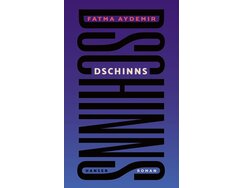
Fatma Aydemir’s second novel, Djinns, is a fast-paced and character-driven family saga set in Germany and Turkey at the end...
Fatma Aydemir’s second novel, Djinns, is a fast-paced and character-driven family saga set in Germany and Turkey at the end of the 20th century. Following the story of the Yilmaz family, a Turkish-Kurdish family who emigrated to Germany when the children were small, the novel touches on the themes of immigrant experiences, LGBTQ struggles, mental health and grief. One week before he is due to retire, Hüseyin, a Turkish Gastarbeiter in Germany, dies of a heart attack, leaving his grieving wife and children behind. The novel focuses on each of these characters in turn, building up a complex portrait of a family torn apart by secrets and silence. Ümit, the youngest child, is struggling to come to terms with his sexuality and his unrequited love for his friend, Jonas. Peri is studying at university while secretly grieving her ex-boyfriend’s suicide. She meets and forms an attachment to a mysterious stranger, Ciwan – who soon vanishes again without a trace. Hakan, their older brother, is living with his white girlfriend, but her parents struggle to accept a son-in-law who isn’t white. Sevda, the eldest sister, has had a very different childhood from the rest of the family: while her younger siblings grew up in Germany, Sevda was left behind with her grandparents in Turkey, where she was denied any access to education. When she joined the rest of the family, she was promptly married off, aged just eighteen. She has since left her neglectful husband and runs her own business, but she has not forgiven her parents for turning her away when she first attempted to leave him. In Istanbul, Sevda and her mother Emine have their first conversation in five years, a tense exchange full of frustrated tenderness. Emine confesses that she had a child before Sevda, whom she gave away to relatives who could not have children. Hüseyin had recently reconnected with the child – who had come out as a transgender man – but sent him away. The child was Ciwan, who then died in a car accident shortly before Hüseyin’s death. The novel opens with the perspective of Hüseyin and ends with that of Emine. While the children’s sections are written in the third person, Hüseyin and Emine’s sections are told in the second person, and it’s left to the reader to decide whether the parents are being challenged by their children about their actions. With its interweaving of perspectives and frequent use of flashbacks, this is an engaging novel which promises to appeal to fans of Zadie Smith’s White Teethand Bernadine Evaristo’s Girl, Woman, Other.
- Publisher:
- ISBN:
- 978-3-446-26914-9
- Author:
- Fatma Aydemir
- Pages:
- 368
- Price:
- € 24.00
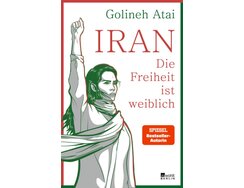
A fascinating portrait of Iranian society from the point of view of nine women. Author Atai chronicles over forty years...
A fascinating portrait of Iranian society from the point of view of nine women. Author Atai chronicles over forty years of control of the country by Islamic religious leaders, and the stifling of all democratic impulses.
- Publisher:
- Topic:
- Non-fiction
- ISBN:
- 3-7371-0118-3
- Author:
- Golineh Atai
- Pages:
- 320
- Price:
- € 22.00

Pig has been alone for a few weeks. He gazes bleakly out of the window. Somewhere behind this heaven there...
Pig has been alone for a few weeks. He gazes bleakly out of the window. Somewhere behind this heaven there will be another heaven, and behind that another. Badger has invented a machine that allows him to travel between worlds. Exploring with the machine, he encounters God. The book tells of the happiness of finding allies. Of wanderlust and the longing for the known. About this world, the hereafter and the strange expanses in between.
- Publisher:
- Topic:
- Fiction
- ISBN:
- 3-86391-321-3
- Author:
- Noemi Somalvico
- Pages:
- 144
- Price:
- € 18.00

This narrative tells the story of Nastia, a Ukrainian woman born about 1945 who becomes an engineer, wife and mother...
This narrative tells the story of Nastia, a Ukrainian woman born about 1945 who becomes an engineer, wife and mother during the Brezhnev period of the Soviet Union, emigrates after the fall of the Iron Curtain and leads the difficult life of a poor immigrant woman in Berlin up to the present. A plausible, realistic, sober and hauntingly timely depiction of the challenges of a middle-class life in the Soviet Union and those confronting Eastern European immigrants in Western Europe.
The anonymous narrator, whose mother was brought to Germany from Ukraine as a forced labourer in 1944 and drowned herself in 1956, moves to Berlin after the fall of the Wall. She hires Nastia, a Ukrainian immigrant of about 50, as a cleaner. The narrator is reminded of her mother, and recounts Nastia’s biography.
Nastia was born during the German occupation, studying in Kiev and becoming a building engineer. She married Roman, a Crimean Karaite, who had persuaded an administrative official to change his ‘nationality’ from ‘Jewish’ to ‘Ukrainian’, and so avoided Soviet anti-Semitism. Their daughter, Vika, was ‘a difficult, withdrawn child’ who had then married at 19 and had a child. With Nastia’s invalid mother, the extended family of six lived in a tiny flat.
The Ukrainian economy collapsed along with the Soviet Union. Vika’s husband disappeared and Vika emigrated illegally. Roman and Nastia divorced, and food was scarce. Nastia emigrated to Germany, where her older sister Tania lived. When Nastia overstayed her visa, a Russian provided her with forged papers, enabling her to live on Tania’s sofa and work, off the books, as a cleaner.
At this point Nastia’s story rejoins the narrator’s chronology. Using her forged papers, Nastia obtains a provisional residence permit. However, the forgery is exposed and in order to remain in Germany, Nastia marries a German, Achim, recruited through an advertisement. He is indolent and antisocial.
Achim dies, and Nastia receives a widow’s pension; she moves in with the narrator, who says they are friends, although she still employs Nastia as a cleaner. Nastia remains aloof, rejecting the narrator as non-Ukrainian.
After a silence of many years, Vika calls Nastia from a hospital in the Netherlands. Nastia enjoys a summer holiday on the Mediterranean in Sardinia with the narrator, ‘for the first and probably last time in her life’. She obtains German citizenship, but although her legal status in Ukraine is uncertain, she packs and leaves for Kiev.
Nastia’s Tears begins as a story within a story, but the outer and inner stories ultimately merge. Told largely from the perspective of the first-person narrator, from a very early stage Nastia’s history is recounted in the third person. However, in contrast to the modern psychological novel characters’ motivations are not often made clear or logical, and the text has the aloof, almost documentary point of view that has become a hallmark of Wodin’s work, favouring telling over showing. The rhythm of the writing is lively and varied.
Wodin’s She Came from Mariupol (Michigan State UP, forthcoming April 2022, trans. Alfred Kueppers), which was also a jury selection for New Books in German.
- Publisher:
- ISBN:
- 3-498-00260-0
- Author:
- Natascha Wodin
- Pages:
- 192
- Price:
- € 22.00
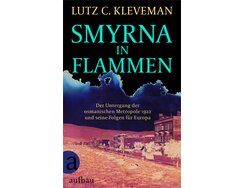
One hundred years ago, in 1922, tens of thousands of people lost their lives in the fire that almost completely...
One hundred years ago, in 1922, tens of thousands of people lost their lives in the fire that almost completely destroyed the city of Smyrna, the legendary port of the Ottoman Empire. This devastating event that effectively brought an end to the Greco-Turkish war changed Europe for ever; it was followed by a population exchange of almost two million Christians and Muslims, which was to be a precursor to all the ethnic cleansing of the 20th century.
Lutz C. Kleveman’s Smyrna in Flames offers an engaging and detailed account of the author’s journey, undertaken just prior to the outbreak of the Coronavirus pandemic, from Piraeus and the island of Chios in Greece to the cities of Cesme and Izmir (as present-day Smyrna is now known). Using the historical and cultural backdrop at each location as the context, Kleveman travels across borders and through time, explaining the background to and the reasons for the many conflicts – political, territorial, ethnic and cultural – that have gripped the region since the 19th century. He demonstrates how these led directly to the fire in September 1922 and the subsequent mass population exchange, and clarifies how the ongoing refugee crisis across Southern Europe and Asia Minor is a modern-day manifestation of these conflicts.
Kleveman’s study is thoroughly researched, with the author interviewing prominent local writers, workers and EU volunteers and undertaking investigative research at each location throughout his journey to explore how tensions between the Ottoman Empire and Greece created the context for the Smyrna fire. His use of location to expand upon each specific aspect of the history means that information is presented in a more personal than chronological order, allowing readers engage closely with the different threads, piecing them together to gain a holistic understanding of the subject matter.
The text is given a further personal touch through Kleveman’s account of his personal engagement with the current refugee crisis and the backdrop to his personal situation, including his time as a student at LSE and a relationship breakdown that led him to undertake his journey. His chapter on the fire itself is graphic and emotive, taking almost an eyewitness perspective on the events, and this underlines its historical and current importance.
The book is clearly intended for an audience interested in European history, politics and culture yet it is written in a straightforward style that will appeal to a general as well as an academic audience, in particular the sections relating to the current refugee crisis. Lutz C. Kleveman is a freelance journalist and author who divides his time between the USA and Germany and writes in both English and German. He has reported from many of the world’s conflict zones including the Balkans, the Caucasus and the Middle East. None of his works written originally in German has yet been translated into English.
- Publisher:
- ISBN:
- 3-351-03459-8
- Author:
- Lutz C. Kleveman
- Pages:
- 381
- Price:
- € 24.00
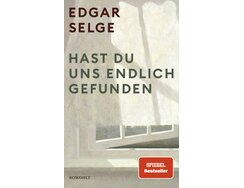
Edgar Selge is a well-known German actor, now in his early 70s, who used the enforced leisure of the Covid pandemic to reflect upon and try to...
Edgar Selge is a well-known German actor, now in his early 70s, who used the enforced leisure of the Covid pandemic to reflect upon and try to make sense of his experience of growing up in post-war Germany. With echoes of Bernhard Schlink’s The Reader, So You Finally Found Us has sold more than 100,000 copies and has been on the SPIEGEL bestseller list for 19 consecutive weeks.
Selge’s story is typical of the post-war generation and an example of Vergangenheitsbewältigung – the attempt to come to terms with Germany’s Nazi past. Just as his parents had to deal with collective guilt and the sudden overturning of all they were brought up to believe, Selge has to reconcile the love he feels for his parents with the knowledge that they were complicit in the atrocities of the Holocaust.
The novel explores universal themes, including right and wrong, guilt and atonement, transgression and forgiveness. It also deals, both literally and figuratively, with freedom and imprisonment: the author’s father is a prison warden and the young Selge often feels like a prisoner himself, longing to escape the strict household discipline imposed upon him.
The book is written in the first person and eschewing chronology, it recounts a series of memorable incidents that provide points of departure for the author’s reflections. It opens with a description of an “at-home concert” given by the author’s father, a keen amateur musician, for the young offenders in his charge. The father’s enlightened attitude to the justice system is subsequently contrasted, however, with a brutal beating of Edgar for a forbidden visit to the fair.
We learn that the family were refugees from Germany’s eastern territories at the end of the war, and that Edgar, born in 1948, is the third of four sons (a fifth son having died while playing with a hand grenade). Running through the story is the traumatization of the parents by the past, despite Edgar’s apparently secure middle-class surroundings: the disciplining of the young Edgar is an attempt to impose order in a world that has lost its moral compass, and music and literature are some of the few permanent and reliable anchors in a sea of chaos.
The beatings only exacerbate Edgar’s waywardness, and he escapes into his own fantasy world. Above all, the author wants to understand his confused feelings towards his father. Why did he never talk about the punishments and mild sexual abuse inflicted on him? Was he too in denial?Was he ashamed to admit that someone he loved and respected could treat him so badly, just as his parents struggled with the idea that the values of their revered Vaterland could be so wrong?
The key people in Selge’s life are portrayed with great sensitivity and emerge as complex characters, full of human inconsistencies: his father loving and humane, but defensive of the old regime; his mother from highly orthodox background, struggling to shed her prejudices, and suffering a physical and mental breakdown when finally confronted with the truth of the Holocaust.
The narrative structure is also characterized by a blurring of perspective reminiscent of Proust and the book is rich with cultural resonances including Shakespeare and Dostoyevsky. Atmospheres and emotions are evoked with vivid, sensuous language.
This is a highly readable and engaging book, and above all, a plea for understanding. Though it makes readers feel the full horror of the concentration camps, it also provides a profound insight into the moral confusion of the war generation, and a sensitive counterpoint to contemporary currents such as cancel culture.
- Publisher:
- ISBN:
- 3-498-00122-1
- Author:
- Edgar Selge
- Pages:
- 304
- Price:
- € 24.00
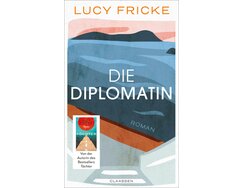
Fred is an experienced and ambitious German consul. A woman who rarely gets ruffled, at home everywhere and nowhere. But then,...
Fred is an experienced and ambitious German consul. A woman who rarely gets ruffled, at home everywhere and nowhere. But then, in Montevideo, she falters for the first time in her career and finds herself transferred to politically volatile Istanbul, her greatest challenge yet. Caught between the Justice Palace and summer residence, the secret service and German-Turkish cooperation, between affairs and loneliness, she is confronted with the limits of friendship, the rule of law and the European idea.
- Publisher:
- ISBN:
- 978-3-546-10005-2
- Author:
- Lucy Fricke
- Pages:
- 256
- Price:
- € 22.00
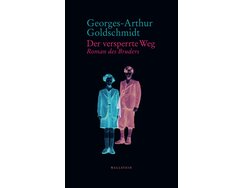
In this slim, unusual and hauntingly written fictionalised memoir, Georges-Arthur Goldschmidt, now aged 93 and ‘a French author of German...
In this slim, unusual and hauntingly written fictionalised memoir, Georges-Arthur Goldschmidt, now aged 93 and ‘a French author of German origin’, tells the story of his older brother, here called Erich, with the book becoming a poetic account of Erich’s life, and a kind of apology for the author’s own.
The affluent secular-Jewish Goldschmidt family enjoy a pleasant life in Hamburg until the Nazi takeover. Their older son Erich’s even tenor is disrupted by the arrival of an over-sensitive and petulant younger brother –the author– who is careless with Erich’s toys. Because of their Jewish origins, the two boys are sent away, first to Italy, then to a grim boarding school in Savoie with very few frills. Erich runs away in 1944 to join the Résistance, leaving his brother behind. He seeks refuge with a French pastor who supplies him with arms and ammunition, and embarks on a heroic odyssey, sleeping under the stars and taking part in the liberation of Paris and Alsace. He builds a successful military career, ultimately becoming a major in the French colonial forces in Algeria, and afterwards works at the Crédit Agricole bank.
Told from the point of view of the older brother, the story is also an affecting account of the vexed relationship between the two brothers. Half-way through, events are interrupted to discuss the meetings between the two in real life, once in 1947 and again in the late 1970s ‘when it finally became possible to shake off a bad conscience out of sheer reparation’. ‘Germany had become affluent, and was able to “engage” with the past.’ The irony is bitter and almost undetectable as the text moves between childhood memoir, adventure story and a meditation on the past, on guilt and on atonement.
Goldschmidt is the recipient of the Nelly Sachs Prize, the Goethe Medal, the Joseph Breitbach Prize and the Prix de l’Académiede Berlin and his books include Der Unterbrochene Wald and Vom Nachexil. In The Obstructed Path, he has produced a highly original work, an empathetic re-narration of a life. His striking, quiet and elegiac writing tells an extraordinarily heroic story that has acquired almost mythical status in his reflection over the decades.
- Publisher:
- ISBN:
- 978-3-8353-5061-8
- Author:
- Georges-Arthur Goldschmidt
- Pages:
- 111
- Price:
- € 20.00
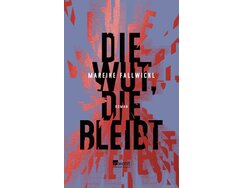
The Rage that Remains is a dark and challenging, kitchen-sink-meets-gang-violence tale set in Salzburg and dealing with suicide, family, friendship,...
The Rage that Remains is a dark and challenging, kitchen-sink-meets-gang-violence tale set in Salzburg and dealing with suicide, family, friendship, gender and sisterhood. A remarkable examination of women’s roles and experiences, set against the backdrop of Covid lockdowns, that should appeal to readers of Gillian Flynn, Otessa Moshfeg and Emma Cline.
Helene gets up at dinner one evening, walks to the balcony and steps over the edge, leaving her family (ineffectual husband Johannes, daughter Lola and younger sons Maxi and Lucius) bereft of its lynchpin. Helene’s childhood friend, Sarah, comes to help: she’s a successful novelist with a younger partner, a big house and a cleaner, but she moves in, learning the truth of a mother’s lockdown life and realising she should have supported her friend better.
Challenged by Lola, and in conversation with the ‘ghost’ of Helene, Sarah becomes willing to confront society’s expectations of women. She stops controlling her eating and dressing to please men, recognises the one-sided nature of caring, finally tells Johannes he must parent his own children, and ejects her partner.
Lola has no natural parent (though her absentee biological father, ‘The Begetter’ provides generous financial support) and struggles to cope with her mother’s sudden, unexplained death. She catapults into self-harm, an eating disorder and a growing inner rage. Attacked by boys while skateboarding, her fury at female impotence in the face of male violence propels her to join a women’s self-defence group. She learns to love her body as a machine that works for her and can be strong and look the way she wants regardless of societal expectations.
Lola’s voracious reading leads her to conclude that self-determination for women means an eye for an eye, though not killing. She, her best friend Sunny and two other girls from the class become vigilantes, seeking out men who hurt women, beating them up and carving K for Karma onto the men’s faces.
When the group targets a paedophile ex-teacher, the possibility that her mother may have been one of his victims makes Lola careless, and the man has a heart attack while being beaten. Lola alerts a neighbour, but the group realise they may be caught and decide to run away using money from The Begetter, in order to continue their work. Lola’s story ends here; enveloped in the love of her friends, empowered to use the rage that remains inside her to kindle other women’s anger and prompt them to do whatever it takes until women stand together and society achieves an equality that makes violence obsolete.
The story is told from the points of view of Lola, Sarah and occasionally Helene, allowing the author to question women’s roles and responses from different angles: the consequences of having no space to be yourself; women’s visceral commitment to the children they bear; the invisible daily grind of domestic duties; society’s assumptions about women’s capabilities.
Lola represents more explicit rage against the status quo, rejecting men both as partners and as trustworthy members of society. But she eventually comes to terms with her mother’s death, seeing it as a final, personal response to society’s betrayal of women in general. Moving from self-harm to self-love, from starvation to focused eating, Lola rejects the expectation that women will be slim, weak, desirable and harm-able.
The alternating points of view and the novel’s diverse and periodically shocking content make for a compelling and uncomfortable narrative full of fundamental truths and important questions about the everyday dangers, fears and restrictions faced by women and girls. The direction it will take remains a mystery to the end.
- Publisher:
- ISBN:
- 978-3-498-00296-1
- Author:
- Mareike Fallwickl
- Pages:
- 384
- Price:
- € 22.00
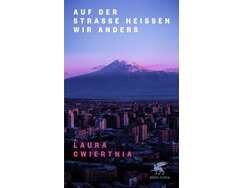
Laura Cwiertnia’s debut novel We Have a Different Name on the Street is a captivating and sensitively written family saga,...
Laura Cwiertnia’s debut novel We Have a Different Name on the Street is a captivating and sensitively written family saga, following four generations from Armenia to Germany via Istanbul and Jerusalem. Exploring how the devastating impact of the 1915 genocide continues to make itself felt today, the novel draws on Cwiertnia’s own first visit to Armenia.
Karla is a sociology student, with an Armenian father and a German mother. She seems to belong nowhere: German strangers see her as Turkish, but her Turkish friends do not. Her father, Avi, came to Germany after a childhood of poverty in Istanbul and Jerusalem. Having faced discrimination throughout his life, he instinctively hides his Armenian heritage, rarely discussing it with his daughter.
When Karla’s grandmother Maryam dies, however, she leaves a list of 14 carefully written bullet points on her bedside table: directions for an Armenian funeral and burial. The final bullet point relates to an ornate gold bracelet: it is to be given to Lilit Kuyumcyan – a name none of the family recognises.
Karla persuades her father to travel with her to Armenia to find Lilit, and the novel moves back and forth in time, interweaving the stories of the family’s different generations.
The gold bracelet, it turns out, belonged to Armine, Karla’s great grandmother, and was one of four bracelets made by her father for each of his daughters. Armine is just ten when she is displaced to Istanbul, her family murdered by Ottoman troops. She becomes a wife and an unwilling mother to Maryam, whom she denies an education, convinced that learning would only place the girl in danger – a danger which seems realised in the Istanbul pogrom of 1955. Traumatised and unable to face her past, Armine destroys a letter proving that her younger sister Lilit is also alive.
Back in the present day, Avi and Karla finally reach a spot deep in the Armenian countryside where they find Lilit’s granddaughter – with a matching bracelet. Karla realises that she has gained much more than an understanding of her own family; she has finally found a homeland.
While her depiction of historical events is dramatic and moving, Cwiertnia’s use of tone and subtle humour ensures the novel remains ultimately positive. Engaging and evocative, Outside we have another name promises to appeal to fans of Elif Shafak’s The Bastard of Istanbul and Jonathan Safran Foer’s Everything is Illuminated.
- Publisher:
- ISBN:
- 978-3-608-98198-8
- Author:
- Laura Cwiertnia
- Pages:
- 240
- Price:
- € 22.00
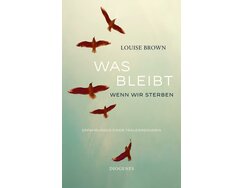
An accessible, autobiographical account of grief, death and bereavement, this is an accessible, compelling and sometimes challenging account of a...
An accessible, autobiographical account of grief, death and bereavement, this is an accessible, compelling and sometimes challenging account of a central aspect of the human experience.
Taking an open, matter of fact and direct approach, and deploying a personal, conversational tone, Louise Brown, who is a funeral orator as well as a writer, journalist and podcaster, aims to leave her readers feeling more comfortable and less disconcerted when talking about death, and to help them deal more effectively with existential fears.
She splits her material into three main parts: being confronted with death, living with sadness and loss, and accepting the finite nature of life. Each part is split into short chapters dealing with different anecdotes or themes, and the overall structure follows the grief arc that she experienced after the death of her parents, ending with how she feels many years later.
Some chapters depart from this structure, though; with the consent of the families concerned, some are biographical accounts of the lives of people who have died; others look at Brown’s experiences as a funeral orator (hired on a freelance basis by families who want an address from someone other than a member of the clergy). Examples are drawn from both German-language and UK/US contexts, and the short and relatively self-contained chapters make it easy for readers to break off and pick up again if they find the subject matter challenging. Individual chapters could also make good points of departure for group discussions at death cafes or in bereavement counselling groups.
Providing an insight into a tradition that may be less familiar to English-language readers, the book’s focus on the work of a funeral orator is both timely and illuminating. Its mix of personal biography and broader reflection will appeal to readers of memoir, self-help, and creative non-fiction, including H is for Hawk by Helen Macdonald and What to Do When I’m Gone by Suzy Hopkins and Hallie Bateman. A consoling and liberating book that gives its readers the courage to focus their lives on the things that matter.
- Publisher:
- ISBN:
- 3-257-07176-0
- Author:
- Louise Brown
- Pages:
- 256
- Price:
- € 22.00
Contact

